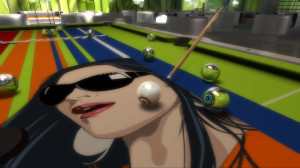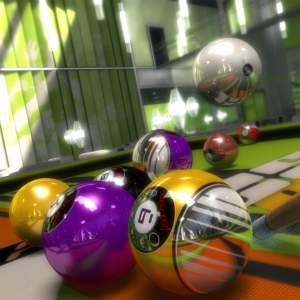Pool Nation Review
This game was reviewed on the PlayStation 3.
Pool is one of those games that, like Monopoly, each and every player seems to have their own set of rules for. What’s more, the game looks completely different depending on what side of the Atlantic Ocean you play it on, with British pool using smaller red and yellow balls and smaller pockets, and North American pool using larger, numbered balls, decked out in spots and stripes, with much larger pockets on a larger table. For the most part, these two varieties have the same rules, with each player assigned either spots, stripes, reds or yellows, and given the task of potting all of their balls before moving on to the grand target, the black ball. This type of pool, regardless of colour or table size, is called 8-ball, and to further confuse matters, there is another type of pool known as 9-ball, which, you guessed it, has 9 numbered balls. Both players work their way through the numbers in succession from 1 to 9, with the second player taking over if the first player fails to pot a ball (and vice versa). Whoever pots the final ball is the winner. Thankfully, Pool Nation, from UK developer Cherry Pop Games, contains both the 8- and 9-ball varieties – although sadly not the British iteration of the game. This gives players the chance to try out both types of pool, as well as a number of ‘unofficial’ versions of the game.
The first thing that you’re going to want to do when starting up Pool Nation is check out the tutorial, as, although the game seems fairly simple on the surface, there are a number of techniques that you’ll want to learn if you’re going to beat the best opponents that the various tournaments have to offer. Of course, you’ll have the ability to use the staple pool moves such as swerve, chip and spins, but Pool Nation allows you to combine these various effects to pull off shots such as a Knife Edge (which bounces the cue ball off of the side of the table to get around a blocking ball) or a Super Spin (which chips the ball forward before the spin curves it backwards around a line of balls). To a pool novice, such as myself, these moves sound a little too much like power-ups when read on the page, but seeing them in game allows you to realise that someone adequately skilled with a pool cue would be able to pull these moves off in real life, and be the envy of their friends when playing at the bar.
 The tutorial for Pool Nation understandably takes players through the various PlayStation 3 control methods of the game, which are actually incredibly simple to understand. Similar to games such as Tiger Woods PGA Tour, the left analogue stick controls the aim of your cue, whilst the right stick controls the power that you want to put on your shot. A nice touch here is the fact that pressing the R1 button locks the power bar in place, allowing you to fiddle with spins or other techniques, without worrying about keeping the right analogue stick in exactly the right position all along. L2 and R2 control the angle of the cue, allowing for chip shots, while L1 allows you to fine-tune your shot by dramatically lowering the sensitivity of the left analogue stick. The only downside to the tutorial is that the menu can sometimes get in the way of where you’re trying to aim your shot, and, unlike games such as FIFA, it doesn’t fade out so that you can see through it, but instead stays solid, obscuring everything that sits behind it. This problem also spreads to the main game modes as well, but here it isn’t so much of a problem, as you can usually take your time and wait for it to disappear before taking your shot, if necessary.
The tutorial for Pool Nation understandably takes players through the various PlayStation 3 control methods of the game, which are actually incredibly simple to understand. Similar to games such as Tiger Woods PGA Tour, the left analogue stick controls the aim of your cue, whilst the right stick controls the power that you want to put on your shot. A nice touch here is the fact that pressing the R1 button locks the power bar in place, allowing you to fiddle with spins or other techniques, without worrying about keeping the right analogue stick in exactly the right position all along. L2 and R2 control the angle of the cue, allowing for chip shots, while L1 allows you to fine-tune your shot by dramatically lowering the sensitivity of the left analogue stick. The only downside to the tutorial is that the menu can sometimes get in the way of where you’re trying to aim your shot, and, unlike games such as FIFA, it doesn’t fade out so that you can see through it, but instead stays solid, obscuring everything that sits behind it. This problem also spreads to the main game modes as well, but here it isn’t so much of a problem, as you can usually take your time and wait for it to disappear before taking your shot, if necessary.
Pool Nation offers up a number of modes for single-player, with tournaments for the 8- and 9-ball rulesets, along with a separate game mode called Endurance. In Endurance, players start with 9 balls on the table, and a timer, which counts down as soon as you hit the cue ball for the first time. At certain intervals (which get shorter as the game continues), extra balls will be added to the table, and players are required to keep the total number of balls on the table under 24, until the timer counts down to zero. It’s a frantic and tense experience, as you attempt to pot balls at a quicker pace than they are added to the table, but most players will likely spend the majority of their time with Pool Nation elsewhere, as there isn’t much incentive within Endurance mode to keep them interested beyond the first couple of attempts.
 The main draw of Pool Nation is within the 8- and 9-ball tournament modes, with each ruleset consisting of four different tournaments across different locations. Each tournament contains up to 12 diverse rounds (read: opponents), and a number of bonus rounds, with stars to be earned through each match by performing certain tasks. The first star is automatically unlocked when an opponent is beaten, and the other two are earned for fulfilling objectives such as beating a certain score, using skill moves, or performing a particular feat. The inclusion of the stars encourages players to use riskier techniques they otherwise wouldn’t draw upon, and adds a fairly addictive reason to come back and try a match again and again.
The main draw of Pool Nation is within the 8- and 9-ball tournament modes, with each ruleset consisting of four different tournaments across different locations. Each tournament contains up to 12 diverse rounds (read: opponents), and a number of bonus rounds, with stars to be earned through each match by performing certain tasks. The first star is automatically unlocked when an opponent is beaten, and the other two are earned for fulfilling objectives such as beating a certain score, using skill moves, or performing a particular feat. The inclusion of the stars encourages players to use riskier techniques they otherwise wouldn’t draw upon, and adds a fairly addictive reason to come back and try a match again and again.
Bonus rounds are unlocked by earning at least two stars on the match directly tied to them, and these operate on different rules from the main matches, such as Straight (be the first to pot 30 balls), Killer (lose a life if you fail to pot) and Rotation (where each ball is assigned points, and the first player to 61 points wins). These bonus rounds add a welcome change from the main tournament mode, and the fact that they unlock aesthetic customisation options for balls, cues and cloths means that completing them is a worthwhile exercise.
Visually, Pool Nation does perhaps the best job that can be expected when portraying a sport that isn’t exactly known for its looks, even if it does make a couple of strange design decisions. The main issue that will have you scratching your head is the fact that pool cues float around the table and take shots almost as if being held by a disembodied participant, which is reminiscent of the enchanted armour scene towards the end of Bedknobs and Broomsticks. This would have been an understandable design decision had no effort been made to establish a series of characters within Pool Nation, but the fact that each competitor you face has their own biography and is able to be unlocked makes it a little baffling that they are in no way visually represented in game. In terms of visual fidelity, though, Pool Nation is easy on the eyes, with polished balls, visible texture on the tables’ cloth, and a sprinkling of chalk dust accompanying heavy hits. In terms of audio, the music is unobtrusive and inoffensive, and does a good job of staying in the background, while the sound of balls hitting each other and the occasional ball hitting the floor sounds authentic.
All in all, Pool Nation is one of the most faithfully realised and entertaining virtual versions of pool that I’ve had the chance to play, and accurately depicts the sense of achievement when you manage to pull off a lucky shot, or the sense of despair when you see a ball that was seemingly destined for the pocket bounce off of the corner cushion. There’s enough content here to keep fans busy for a while, and the inclusion of unlockable content and star ratings only adds to the addictiveness of what’s on offer. Aside from a couple of small niggles which prevent the game from attaining a perfect score, Pool Nation is an admirable attempt to represent a sport that isn’t often shown in videogames, and I certainly can’t imagine many people walking away from this one disappointed.
About This Post
